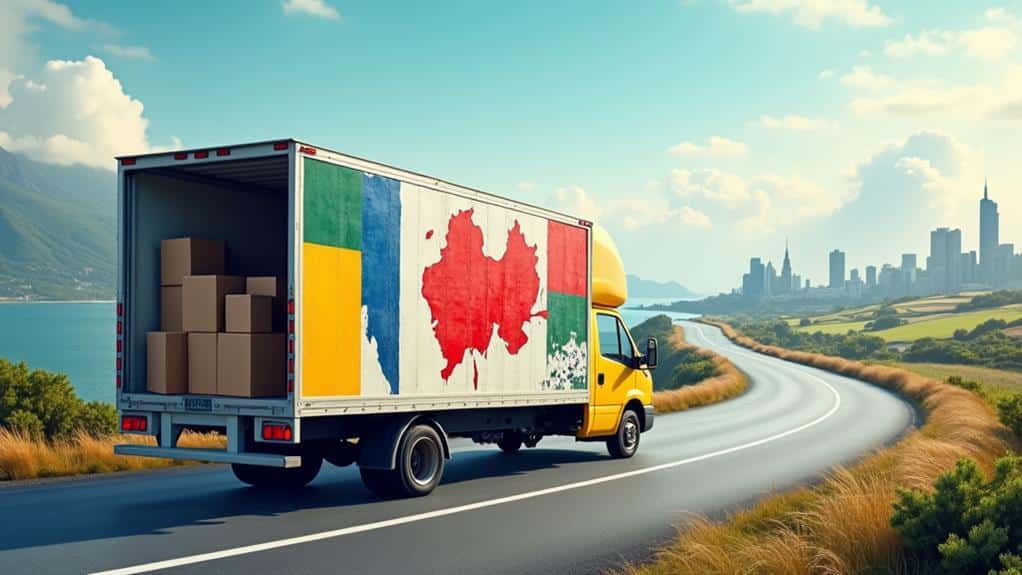
International Removals: The Ultimate Guide
International removals require careful planning and preparation. We recommend starting 2-3 months in advance, researching customs regulations, and obtaining quotes from accredited removal companies.
Proper packing is vital, so consider professional services for added safety. When choosing transportation, weigh options like sea freight, air freight, and road transport based on your needs.
Don’t forget to gather all necessary documentation and create a detailed inventory list. Upon arrival, prioritise unpacking essentials and take time to adapt to your new surroundings.
By following these steps, you’ll guarantee a smoother move to your new home abroad. Our extensive guide offers even more insights to make your international move a success.
Key Takeaways
- Begin planning 2-3 months beforehand, creating a detailed timeline for decluttering, documentation, and packing.
- Select a reputable removal company with international accreditations and experience in your destination country.
- Choose appropriate transportation methods based on shipment size, urgency, and budget constraints.
- Research and prepare for customs regulations, including necessary documentation and potential prohibited items.
- Organise systematic unpacking and integrate into the new community through local engagement and cultural activities.
Planning Your International Move
Planning an international move is a complex undertaking that requires careful preparation and foresight. To guarantee a smooth relocation, we recommend beginning the international moving process at least 2-3 months in advance. This timeline is especially important during peak periods like summer and school holidays when moving resources may be in high demand.
Face-to-face meetings with potential removal companies can provide clarity and help you assess their reliability, which is essential for a successful international move.
Start by creating a detailed moving timeline that outlines key tasks. This should include decluttering your belongings, gathering necessary documentation such as passports and visas, and researching customs regulations for your destination country.
Understanding these regulations is essential to avoid delays and additional fees during shipping.
Next, obtain quotes from multiple international removal companies. Compare their services, costs, and inclusions to find the best fit for your needs and budget.
Don’t overlook the value of professional packing services, which can greatly enhance the safety of your belongings during transit.
As you progress through planning your international move, familiarise yourself with the customs regulations of your destination. Be aware of prohibited items and any special permits required.
Choosing a Removal Company

Selecting the right removal company is fundamental for a successful international move. When choosing a reputable international moving company, we need to look for specific accreditations like FIDI FAIM or BAR Overseas, which indicate high service standards.
It’s imperative to conduct thorough research, including reading customer reviews and verifying licences. Company reputation and experience play a significant role in guaranteeing a smooth relocation process, as established firms are more likely to offer an extensive range of services.
We should request quotes from multiple companies and compare not only prices but also the additional services included, such as packing materials, customs clearance assistance, and insurance coverage.
It’s advisable to choose a moving overseas company that assigns a certified move consultant to guide us through the process, including departure date selection and monitoring our belongings during transit.
When selecting an international moving company, we should ask questions about their experience with our destination country’s customs regulations. This familiarity can help facilitate smoother clearance and avoid potential delays.
Packing and Preparation

Let’s explore the vital aspects of packing and preparation for your international move.
We’ll first examine the essential packing materials you’ll need to ensure your belongings are protected during transit. When packing fragile items, consider using bubble wrap and tissue paper for added protection.
Additionally, we’ll discuss the importance of decluttering before your move, which can greatly reduce your moving costs and simplify the entire process.
Essential Packing Materials
The foundation of a successful international move lies in having the right packing materials at your disposal. Essential packing materials include sturdy boxes of various sizes, bubble wrap for cushioning fragile items, and packing tape to secure boxes during transit.
We recommend using packing paper or newsprint to wrap delicate items, as they provide protection without causing scratches.
Professional packing services can greatly reduce moving stress and guarantee items are packed securely using specialised techniques, especially for fragile belongings.
For valuable or oversized items, custom crating is often necessary to guarantee they’re securely contained and protected.
Don’t forget the importance of labelling boxes clearly with their contents and designated room at the destination. This simple step streamlines the unpacking process and guarantees efficient organisation upon arrival.
Whilst it’s possible to handle packing yourself, utilising professional packing services can greatly enhance packing efficiency and reduce the risk of damage.
These experts employ specialised materials and techniques tailored for international moves, giving you peace of mind during the relocation process.
Decluttering Before Moving
Before embarking on your international move, decluttering should be a top priority. By reducing the volume of your belongings, you’ll greatly lower your international moving costs and streamline the packing process.
We recommend adopting a systematic approach to decluttering, categorising your personal items into “keep,” “donate,” “sell,” and “discard” groups. This method not only helps you identify essential items but also makes packing more efficient and organised.
Assessing item necessity is vital, especially when dealing with possessions stored in garages and lofts, which often accumulate unused items over time.
Decluttering early in the moving process allows us to create a more manageable timeline for packing and preparation, alleviating stress as your moving date approaches. By donating or selling items you no longer need, you’ll lighten your load and potentially gain tax deductions or extra cash to fund your move.
Remember, every item you choose not to take reduces your shipping costs and simplifies your relocation.
As you sort through your belongings, focus on retaining only the most essential items for your new home abroad. This process will help you start afresh in your new location whilst ensuring that you’re not burdened with unnecessary possessions.
Transportation Options

When planning your international move, understanding the available transportation options is vital for a successful relocation. International moving services typically offer three primary methods: sea freight, air freight, and road transport. Each option caters to different shipment sizes and urgency levels, impacting your overall cost and delivery timeline.
Stress reduction strategies can help you navigate the complexities of choosing the right transportation method for your needs.
Sea freight is the most cost-effective choice for large shipments. We recommend Full Container Load (FCL) for substantial moves or Less Than Container Load (LCL) for smaller volumes.
Whilst sea transport takes longer due to port stops and customs clearance procedures, it’s ideal for budget-conscious relocations.
For smaller, urgent shipments, air freight offers the fastest delivery. It’s considerably more expensive but perfect for high-value or time-sensitive items.
We suggest considering this option if speed is your primary concern.
Road transport plays an important role in international removals, facilitating inland movements to and from ports. It guarantees seamless connectivity between your origin and destination properties.
When selecting a transportation method, we advise weighing factors such as shipment size, urgency, and budget.
Customs and Documentation

Managing customs regulations and documentation requirements is a vital aspect of any international move. We can’t stress enough the importance of researching your destination country’s specific customs regulations before packing. This will help you avoid potential delays or additional costs during customs clearance.
When preparing for your move, ensure you have all the required documents to hand. These typically include a packing list, power of attorney, passport, and any necessary vehicle documentation.
It’s essential to create an accurate and detailed inventory list of all your items, including their dimensions, weight, and value. This information will be invaluable during the customs clearance process.
Be aware that certain items may require special permits or additional documentation to import. Familiarise yourself with any restrictions or regulations specific to your destination country to avoid complications.
We recommend having multiple copies of important paperwork, such as visas and customs declarations, readily accessible during transit. This precaution can save you from potential headaches and make for a smoother international relocation experience.
Settling in Your New Home

As we settle into our new home abroad, let’s focus on efficiently unpacking and organising our belongings.
We’ll need to systematically arrange our items, prioritising essentials and creating a functional living space that suits our needs.
Whilst organising, we should also begin adapting to our new surroundings, familiarising ourselves with the layout of our home and exploring the immediate neighbourhood to start feeling comfortable in our new environment.
Unpacking and Organizing Belongings
The moment of truth arrives as you step into your new home with boxes and belongings in tow. Our first task is to conduct a thorough inventory check, ensuring all items have arrived safely and in good condition. This vital step sets the foundation for a smooth unpacking process.
We’ll start by unpacking essential items like clothing, toiletries, and important documents. This approach allows us to establish a sense of comfort and functionality straight away.
Next, we’ll organise our unpacking efforts room by room, focusing on the kitchen and bedrooms first. This strategy helps create functional spaces quickly, reducing chaos during the adjustment period.
As we unpack, we’ll implement storage solutions such as bins and organisers to maintain order, especially if space is limited. These tools are invaluable for decluttering and maximising our new home’s potential.
Adapting to New Surroundings
After the initial unpacking phase, how do we begin to truly settle into our new surroundings? Adapting to a new environment requires a multifaceted approach. We’ll want to familiarise ourselves with the local area, including essential amenities like grocery shops, healthcare facilities, and schools. This knowledge will ease our adjustment and help us establish a comfortable routine.
Engaging with local communities and organisations is vital for building a support network. We should prioritise:
- Attending community classes or events
- Joining local clubs or groups
- Participating in cultural activities
- Volunteering for local causes
- Connecting with neighbours and colleagues
Understanding local customs, language, and regulations is essential for effective integration. We can utilise community resources to learn about cultural differences and social norms.
As we settle in, it’s important to prioritise unpacking essential items first, such as kitchenware and toiletries, to create a comfortable living space quickly.
Frequently Asked Questions
What Does an International Move Cost?
We’ve found international moves typically cost £1,200 to £9,500. To obtain accurate moving quotes, we consider shipping fees, insurance options, customs regulations, transport methods, duty charges, packing materials, storage solutions, currency exchange, and import restrictions. It’s complex, but manageable with proper planning.
How Do You Move to Another Country With All Your Stuff?
We’ll help you move internationally by arranging professional removal services, managing customs regulations, choosing shipping options, and securing insurance. We’ll provide packing materials, offer storage solutions, relocation advice, expatriate support, pet transport assistance, and cultural adjustment guidance.
How Do I Pack My House for an International Move?
Rome wasn’t built in a day, and neither is packing for an international move. We’ll need packing materials, moving checklists, and proper labelling. Let’s focus on delicate items, furniture dismantling, and customs regulations. Don’t forget the inventory list!
How Do You Declutter to Move Across Country?
Let’s begin decluttering by adopting a minimalist mindset. We’ll sort belongings, overcome emotional attachments, and explore donation options. We can host car boot sales, recycle, and use storage solutions. Following a timeline, we’ll implement packing strategies for a smooth house move.
Conclusion
We’ve covered the essential aspects of international removals, from planning to settling in. Remember, a successful move requires careful preparation and the right partners. Did you know that over 280 million people live outside their country of birth? You’re joining a significant global community. By following this guide, we’re confident you’ll navigate the complexities of your international move with ease, setting the stage for an exciting new chapter in your life abroad.


